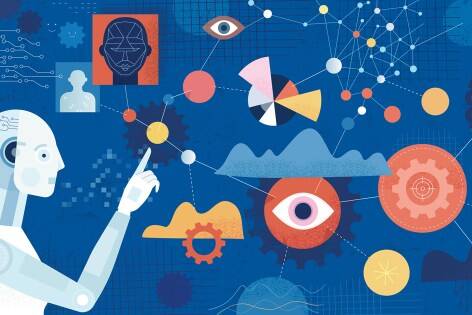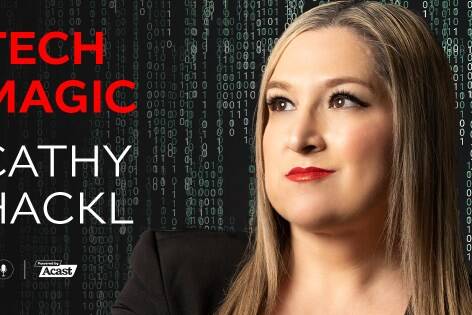Is OpenAI and Microsoft’s ‘bromance’ on the rocks? Plus, AI’s looming impact on your career. Join Mike and Paul as they unpack the growing tension between OpenAI and Microsoft, Brookings Institution’s eye-opening report on generative AI’s potential impact on the U.S. workforce, and Sequoia Capital’s latest market analysis, which predicts a new era of “thinking slow” AI. All this, plus Google NotebookLM’s updates, Adobe Max 2024, a new Midjourney update, Agents in Microsoft Copilot, and more in our rapid-fire section. Listen or watch below—and see below for show notes and the transcript.
Today’s episode is brought to you by Rasa.io. Rasa.io makes staying in front of your audience easy. Their smart newsletter platform does the impossible by tailoring each email newsletter for each subscriber, ensuring every email you send is not just relevant but compelling. Visit rasa.io/maii and sign up with the code 5MAII for an exclusive 5% discount for podcast listeners.
Today’s episode is also brought to you by our AI for Agencies Summit, a virtual event taking place from 12pm – 5pm ET on Wednesday, November 20. The AI for Agencies Summit is designed for marketing agency practitioners and leaders who are ready to reinvent what’s possible in their business and embrace smarter technologies to accelerate transformation and value creation. You can get tickets by going to aiforagencies.com and clicking “Register Now.” When you do, use the code POD100 for $100 off your ticket.
Listen Now
Watch the Video
Timestamps
- 00:05:12 — OpenAI + Microsoft’s Strained Relationship
- 00:18:18 — GenAI Job Exposure
- 00:31:15 — Sequoia Market Analysis
- 00:42:23 — Google NotebookLM Is Becoming a Very Big Deal
- 00:48:23 — Adobe Max 2024
- 00:53:05 — Major Midjourney Update
- 00:55:10 — Playground Releases Playground v3
- 00:58:08 — AI for Customer Success from Ex-HubSpot Exec
- 01:03:08 — Bain + OpenAI Extend Partnership
- 01:06:54 — AI Content Scraping Opt-Out Model
- 01:09:22 — Agents in Microsoft Copilot
- 01:13:22 — Demis Hassabis Speaks at Times Tech Summit
Summary
OpenAI and Microsoft’s Strained Relationship
The partnership between OpenAI and Microsoft, once dubbed “the best bromance in tech” by OpenAI CEO Sam Altman, has started to sour, according to The New York Times. The partnership began with Microsoft investing $13 billion in OpenAI, providing the startup with essential funding and computing power. However, after OpenAI’s board briefly ousted Altman last November, Microsoft reconsidered its approach to further investments, says The Times.
OpenAI, facing significant financial challenges with expected losses of $5 billion this year, has been seeking additional funds and computing resources from Microsoft. However, the tech giant has been hesitant to increase its commitment, leading OpenAI to explore other options.
In response, OpenAI has been attempting to renegotiate its deal with Microsoft, aiming to secure more computing power and reduce expenses. The AI company has also broadened its investor base, recently closing a $6.6 billion funding round. Meanwhile, Microsoft has started to hedge its bets. In March, the company invested at least $650 million to hire most of the staff from Inflection, an OpenAI competitor. Mustafa Suleyman, Inflection’s former CEO, now oversees a new Microsoft group working on AI technologies that could potentially replace OpenAI’s offerings.
This move has caused some friction, with OpenAI executives and employees expressing frustration over Suleyman’s presence at Microsoft and concerns about the sharing of technology between the companies.
Generative AI’s Impact on the American Workforce
A new report from the Brookings Institution takes a data-driven approach to analyzing the potential impacts of generative AI on the American workforce. The study highlights that generative AI could significantly disrupt a wide range of jobs, with over 30% of workers potentially seeing at least half of their tasks affected by AI. It also finds that 85% of workers could see at least 10% of their work tasks impacted.
Unlike previous waves of automation that primarily impacted routine, blue-collar work, generative AI is poised to affect “cognitive” and “nonroutine” tasks, says Brookings, especially in middle- to higher-paid professions, according to the report.
(Fields such as STEM, business and finance, law, and office administration are among the most exposed to potential AI disruption.) The report emphasizes that while generative AI presents both opportunities and risks for workers, society is currently underprepared to address these challenges.
Sequoia Market Analysis
Famed VC firm Sequoia Capital has just released an updated market analysis of the generative AI landscape titled Generative AI’s Act o1 (in reference, of course, to OpenAI’s new o1 model). In it, Sequoia partners Sonya Huang and Pat Grady break down how the generative AI ecosystem is evolving, writing, “Two years into the Generative AI revolution, research is progressing the field from ‘thinking fast’—rapid-fire pre-trained responses—to ‘thinking slow’—reasoning at inference time. This evolution is unlocking a new cohort of agentic applications.”
They find that the foundation layer of generative AI is stabilizing around major players like Microsoft/OpenAI and Google/DeepMind. They also find that the focus is now shifting to the development of a reasoning layer, the latest, most significant advancement being OpenAI’s new o1 model, which enables more deliberate, “System 2” thinking, as opposed to the quick pattern matching of earlier models.
This has also led to a new scaling law emerging, they claim: the more inference-time compute given to a model, the better it can reason. This is shifting the focus from massive pre-training to scalable inference clouds. This is going to have some transformative effects on business as usual—and the authors even anticipate a future “AlphaGo moment” in generative AI, where these systems demonstrate truly novel and superhuman capabilities.
Read the Transcription
Disclaimer: This transcription was written by AI, thanks to Descript, and has not been edited for content.
[00:00:00] Paul Roetzer: There is massive disruption coming. No one seems to be talking about it. Like economists don’t seem to be talking about it. Industry leaders don’t seem to be talking about it. Government leaders don’t seem to be talking about it because they don’t seem to really realize what’s about to happen. And we don’t have answers to what happens to jobs in all these different industries.
[00:00:20] Paul Roetzer: Welcome to the Artificial Intelligence Show, the podcast that helps your business grow smarter, grow better, by making AI approachable and actionable. My name is Paul Roetzer. I’m the founder and CEO of Marketing AI Institute, and I’m your host. Each week, I’m joined by my co host and Marketing AI Institute Chief Content Officer, Mike Kaput, as we break down all the AI news that matters, and give you insights and perspectives that you can use to advance your company and your career.
[00:00:49] Paul Roetzer: Join us as we accelerate.
[00:00:57] Paul Roetzer: Welcome to episode 120 of the Artificial Intelligence Show. I’m your host, Paul Roetzer, along with my co host, Mike Kaput. We are coming to you on, well, it’s Monday, October 21st, 10 a.m. in Cleveland, a beautiful fall day in Cleveland, I must say. I’ve got my pumpkin coffee with me. I am like, I’m all falled out this morning.
[00:01:17] Paul Roetzer: I love it. I was thinking about how we are just under a year away from MAICON 2025, Mike. Because next year’s event is in October; I’m going to get this wrong because I’m saying it off the top of my head, like the 14th to the 16th. Oh my gosh. So it’s literally one year away from MAICON. But it’s fun because you see the beautiful fall colors, and it’s just such an amazing time of year in Cleveland.
[00:01:39] Paul Roetzer: So I’m excited to have everybody back here in Cleveland next year at this time. In the meantime, I’m just going to enjoy my pumpkin coffee. I have one month out of the year where I have to have a pumpkin coffee every day. Alright, we’ve got some big items to talk about. Last week wasn’t like another crazy week of launches and new models and stuff, but there’s a few articles and reports that came out that Mike and I are really going to drill into today that I think provide some really great macro level perspective about what’s going on.
[00:02:11] Paul Roetzer: So I’m excited to talk about those. First, I’m going to say this episode is brought to us by Rasa.io. Talk about a common challenge we all face making our email newsletters truly engaging. Well, Rasa is changing the email newsletter landscape. Imagine each of your subscribers receiving a newsletter tailored just for them.
[00:02:30] Paul Roetzer: Sounds impossible, but Rasa.io makes it possible with their AI powered platform that makes personalization easy. We’ve known the team at Rasa for about six years now. They’ve been a longtime supporter of our Marketing AI Institute. And if you are running or planning to launch a newsletter for your business, you should definitely check out Rasa.io. Head over to Rasa.io/MAII and use the code 5MAII and you’ll get a 5 percent discount. Give it a try. Your subscribers and your engagement rates will thank you. And the episode is also brought to us by our second annual AI for Agencies Summit. This is a virtual conference that’s taking place noon to 5 p.m. Eastern time on Wednesday, November 20th.
[00:03:15] Paul Roetzer: So that’s the live version and then you can also purchase on demand. So if you can’t make it on November 20th from 12 to 5 p.m. Eastern, you can always watch the replay. So the AI for Agency Summit is designed for marketing agency practitioners and leaders who are ready to reinvent what’s possible in their business and embrace smarter technologies to accelerate transformation and value creation.
[00:03:40] Paul Roetzer: During the event, you’ll join hundreds of other forward-thinking agency professionals to consider ways to recruit AI-savvy talent and upscale your team. Explore AI tools that can boost creativity, productivity, and operations. Hear insider stories. I think we have six different agency leaders presenting on their case study within their agency. So it’s going to be all about the agencies that are actually doing this and what they’re learning and being able to share that with you. Understand how it impacts your pricing models and service offerings. That’s a topic we’re going to talk a little bit about in today’s episode. A lot of things happening in that space.
[00:04:13] Paul Roetzer: And then connect with like-minded agency professionals and leaders who are in the midst of their own AI transformation journeys. It’s all presented by a group of world-class agency leaders and experts. You can get your tickets at AIforAgencies.com. Click on register now. So when you do, use the code POD100 and that’ll get 100 off of your ticket. Alright Mike, there’s some brewing drama. We’ve thought that there was some stuff going on with OpenAI and Microsoft, there were some rumors, but the New York Times sort of blew some stuff out with a bunch of inside sources. And, yeah, there’s a lot going on in that Microsoft OpenAI relationship. The former best, what was it, best relate, bromance in tech was what it was called? Maybe not so much anymore. So let’s, let’s get into that.
OpenAI + Microsoft’s Strained Relationship
[00:05:12] Mike Kaput: Yeah, so first up, as you mentioned, OpenAI CEO Sam Altman used to call the partnership between OpenAI and Microsoft, quote, the best bromance in tech. But, according to some new reporting by the New York Times, that partnership has started to sour a bit. So, if you recall, this began with Microsoft investing 13 billion into OpenAI, basically giving them a bunch of essential funding and importantly, computing power. However, after OpenAI’s board briefly ousted Altman last November, apparently Microsoft started reconsidering its approach to further investments, according to the Times.
[00:05:57] Mike Kaput: Now, OpenAI has a lot of financial challenges. They have expected losses of 5 billion this year, and they’ve been seeking additional funds and computing resources from Microsoft specifically. However, apparently they have been hesitant to increase that commitment, which has led OpenAI to explore other options to fund and support their growth.
[00:06:20] Mike Kaput: In response, OpenAI has also been attempting to renegotiate its deal with Microsoft, aiming to secure more computing power and reduce expenses. They also recently, which we reported on, broadened their investor base, closing a 6.6 billion funding round recently. Now, Microsoft has also started to hedge its bets, it sounds like, in March. The company invested at least 650 million in what you might call an acquihire to get most of the staff from Inflection, which was an OpenAI competitor. Mustafa Suleyman, Inflection’s former CEO, now oversees a new Microsoft group working on AI that could potentially replace what OpenAI offers.
[00:07:09] Mike Kaput: And that’s also been causing some friction, it sounds like, based on this reporting. OpenAI executives and employees expressed frustration over Suleyman being at Microsoft and concerns about sharing of technology between the two companies. So, Paul, there’s never a dull moment at OpenAI. Like, can you maybe break down some of the complexities for us here? Like, Microsoft has this huge vested interest in OpenAI’s success, at least it seems like, but they also appear to be creating obstacles to the company’s success. Interesting.
Generative AI’s Impact on the American Workforce
[00:18:18] Mike Kaput: Alright, so our next big topic this week, we just got a new report from the Brookings Institution, which is a well-known nonprofit. And in this report, they take a data-driven approach to analyzing the potential impact of generative AI on the American workforce. And some of these findings are worth paying a little bit of attention to because the study highlights that generative AI could significantly disrupt a wide range of jobs, with over 30 percent of workers potentially seeing at least half of their tasks affected by AI. It also found that 85 percent of workers could see at least 10 percent of their work tasks impacted.
[00:18:59] Mike Kaput: And by assessing this, Brookings utilized estimates shared by OpenAI relating the predicted ChatGPT 4 exposure level of thousands of the tasks that make up the hundreds of occupations defined by the Department of Labor’s O Net database. Now, unlike previous waves of automation that impacted routine blue-collar work, generative AI, they say, is poised to affect cognitive and non-routine tasks, which means it is getting into middle and higher-paid professions.
[00:19:31] Mike Kaput: They highlight fields such as STEM, business, finance, law, and office administration. All of these are the most exposed to potential generative AI disruption. And they also make the point that while there are opportunities and risks for workers with generative AI, society is currently underprepared to address these challenges.
Sequoia Market Analysis
[00:31:05] Mike Kaput: So in our third big topic this week, the famous VC firm Sequoia Capital just released an updated market analysis of the generative AI landscape. Now they titled this Generative AI’s Act 01 in reference to OpenAI’s new 01 model. And in it, Sequoia partners Sonia Huang and Pat Grady break down how the generative AI ecosystem is evolving.
They write, quote, “Two years into the generative AI revolution, research is progressing the field from ‘thinking fast’—rapid fire pre-trained responses—to ‘thinking slow’—reasoning at inference time. This evolution is unlocking a new cohort of agentic applications.”
Read the Transcription
This rewritten content maintains the original context and all HTML tags, while modifying the language to create a streamlined and coherent piece.
Conteúdo relacionado
Gen Z Quer Utilidade da IA—Não Gimmicks
[the_ad id="145565"] Enquanto o mundo do marketing tenta entender a IA, a Geração Z está colocando-a em prática. A mensagem para as marcas é clara: aquelas que oferecem…
IA no Varejo, Tecnologia Vestível, Comércio Distribuído e Moda no Roblox
[the_ad id="145565"] Neste episódio do TechMagic, os apresentadores Cathy Hackl e Lee Kebler reúnem-se novamente para explorar as últimas novidades em IA, hardware tecnológico…
A Equipe de Marketing da Lenovo Impulsiona a Inovação Tecnológica com IA
[the_ad id="145565"] A inovação em IA está transformando o marketing tecnológico ao criar novas categorias de produtos e revolucionar a forma como as marcas globais abordam o…






